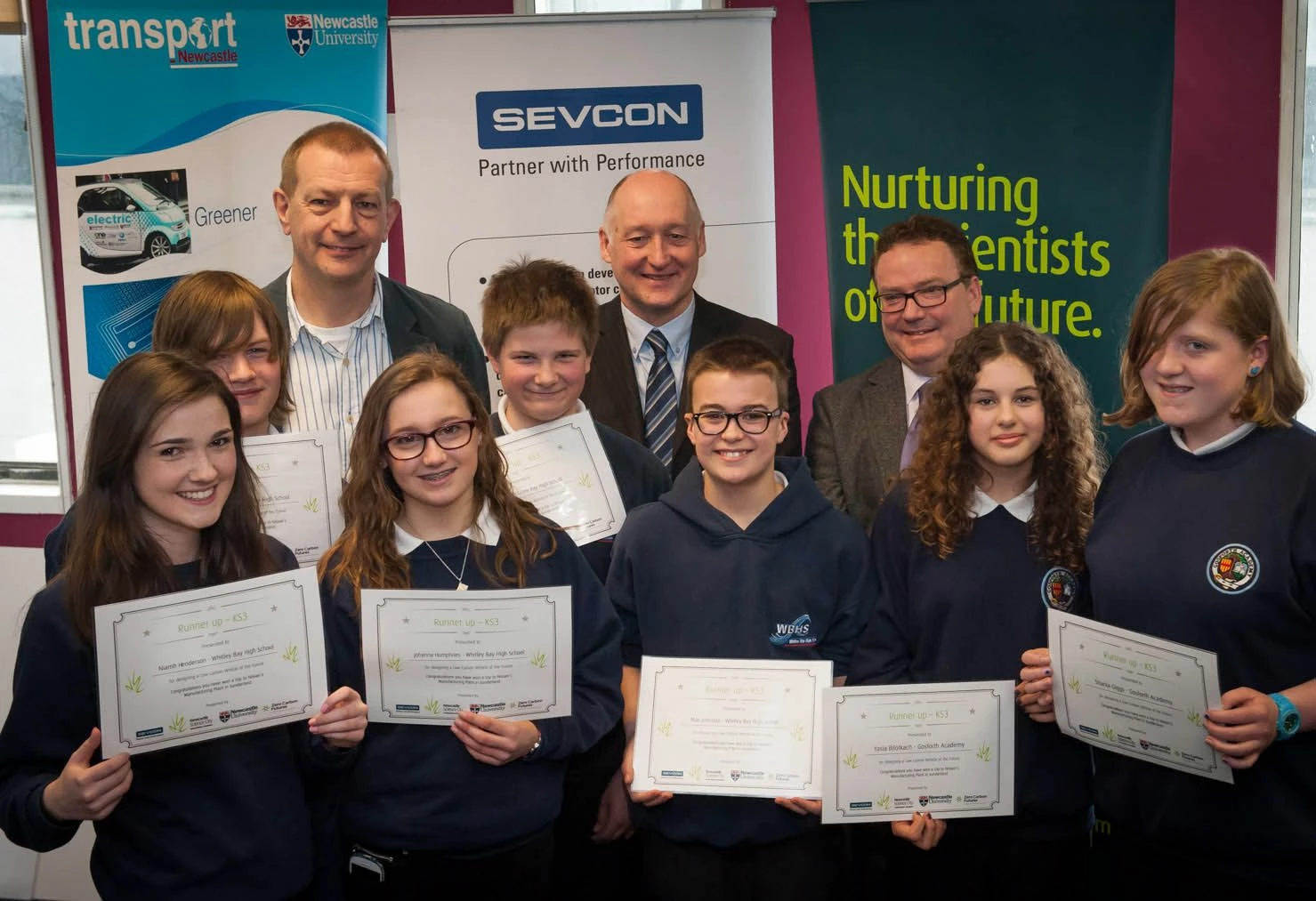
Partner Article
School competition winners awarded cash science prize
Schools from across the region have won a share of a £3,000 cash prize to invest in science and technology following a competition run by Newcastle Science City, a partnership between Newcastle City Council and Newcastle University.
The competition, which was launched at the British Science Festival by Newcastle Science City in conjunction with Newcastle University, Sevcon and Zero Carbon Futures, called on schoolchildren aged 7-16 to use their science skills to design a low carbon vehicle of the future.
The winners were announced (17 Mar) at a special awards ceremony organised by Newcastle Science City at Newcastle University. Six schools from across the region won prizes ranging from £1,000 to invest in science, through to visits to Sevcon and Nissan’s manufacturing plants to see how electric vehicles are made.
Speaking of the competition, Fiona Standfield, Director of Newcastle Science City said: “What we wanted to do with this competition was give youngsters the opportunity to harness their creativity whilst using their science, technology and maths (STEM) skills.
“We were overwhelmed with the number of entries that came in, particularly from girls interested in science and technology. It was an incredibly difficult decision to shortlist from the excellent, creative entries that we received.”
More than 70 entries were received for the competition from schools across the region from Barnard Castle, Durham and Middlesbrough to Newcastle, Gateshead and Whitley Bay.
Designs included everything from aerodynamic trains and solar adapted bikes, to a ‘Rocket Car Boat inter-galactic slicer’ from Rosa Hall at Rockcliffe First School in Whitley Bay and and a ‘Pollution Killing Machine’ by Lewis Rowley at Stevenson Memorial Primary School in Wallsend.
Each design was judged by a panel of expert judges which included electric vehicle component manufacturer Sevcon; Newcastle Science City; Newcastle University; and Gateshead-based Zero Carbon Futures.
Professor Chris Brink, Vice-Chancellor at Newcastle University which donated £3,000 of cash prizes for the competition, said: “Our researchers and students are working at the cutting edge of science to develop new ways for people to move about more sustainably. We hope this competition has encouraged and inspired a next generation of scientists to think about the kinds of transport we could all be using in the future.”
The winners were:
Key stage 4: £1,000
Gosforth Academy (Newcastle)
For their winning design and model of a low carbon maglev train, powered using a combination of solar panels and wind turbines.
Key stage 3: £1,000
Parkside Academy (Crook)
For their amazing electromagnetic train which could be turned off to conserve energy.
Key stage 2: £500 each
Our Lady & St. Anne’s RC Primary School (Newcastle)
For their solar powered car with propeller for extra power.
Dame Allan’s Junior School (Newcastle)
For their eco-car powered by Hydrogen, with accompanying circuit diagram.
The runners up have won visits to Sevcon and Nissan’s manufacturing plant to see how electric vehicles are made.
Key stage 3:
Whitley Bay High School (Whitley Bay)
Gosforth Academy (Newcastle)
Key stage 2:
Our Lady & St Anne’s RC Primary School (Newcastle)
Fordley Primary (Cramlington)
Speaking of his win, Aaron Flack joint winner of key stage 2 from Dame Allan’s Junior School said: “I feel happy and proud of myself in winning. I didn’t think I would win so I am surprised and thrilled. My dad is an engineer and I always wanted to be like him”
Gosforth Academy won the key stage 4 category and was also runner up for the key stage 3 category. James Vennart, Science / Leader of Teaching and Learning commented: “We are absolutely thrilled to have won prizes in this competition. It really has provided the children with a tangible application of their science learning, and has given our pupils the opportunity to use their creativity and understanding of science and technology. We intend to use the prize money on equipment to be used in future STEM projects.”
This was posted in Bdaily's Members' News section by Newcastle Science City .
Enjoy the read? Get Bdaily delivered.
Sign up to receive our daily bulletin, sent to your inbox, for free.








 Navigating the messy middle of business growth
Navigating the messy middle of business growth
 We must make it easier to hire young people
We must make it easier to hire young people
 Why community-based care is key to NHS' future
Why community-based care is key to NHS' future
 Culture, confidence and creativity in the North East
Culture, confidence and creativity in the North East
 Putting in the groundwork to boost skills
Putting in the groundwork to boost skills
 £100,000 milestone drives forward STEM work
£100,000 milestone drives forward STEM work
 Restoring confidence for the economic road ahead
Restoring confidence for the economic road ahead
 Ready to scale? Buy-and-build offers opportunity
Ready to scale? Buy-and-build offers opportunity
 When will our regional economy grow?
When will our regional economy grow?
 Creating a thriving North East construction sector
Creating a thriving North East construction sector
 Why investors are still backing the North East
Why investors are still backing the North East
 Time to stop risking Britain’s family businesses
Time to stop risking Britain’s family businesses